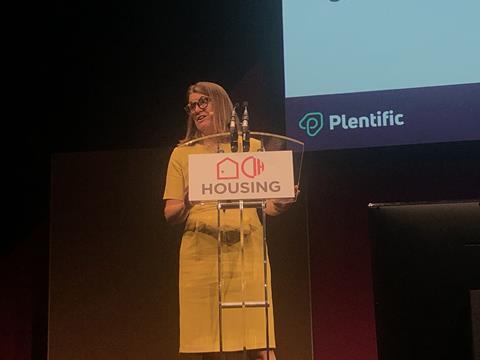MacLean says new homes must meet design criteria
The housing minister has defended Michael Gove’s recent decisions to call in a series of housing schemes on design grounds, emphasising that new homes must meet the government’s criteria.
Gove, the secretary of state at the Department for Levelling Up, Housing and Communities (DLUHC), has drawn criticism from the housebuilding sector after intervening in planning applications in Tunbridge Wells, East Cheshire and Leamington Spa.

The last of these decisions led to AC Lloyd Homes, the SME housebuilder behind the 200-home development, shut down its operations entirely.
Speaking to ∫√…´œ»…˙TV his week at the Chartered Institute of Housing‚Äôs annual conference, Rachel MacLean, minister of state for housing at DLUHC, said she was not aware of the particulars of the AC Lloyd case but stressed her support for the department‚Äôs approach.
“We want a flourishing housing sector, which is why we are committed to building 300,000 homes, but they must be the right homes in the right places supported by local communities,” she said.
“We cannot have homes that don’t meet the government’s criteria, and those are the criteria that local people want.
“They want homes that are sensitive to the area, they want homes that are affordable, they want homes that are sustainable [and] they want them to be beautiful and well designed, so we will make no apologies for being very clear about those in those high-profile planning decisions.”
>> Seven key takeaways from this year’s CIH conference
DLUHC has also received criticism from the housing sector recently for its proposed infrastructure levy.
Thirty industry bodies – including The National Housing Federation, the Home Builders Federation, the Construction Industry Council, the Royal Town Planning Institute, Build UK and Shelter – urging the government to scrap its plans on the grounds that it would result in fewer affordable homes being built in England.
MacLean defended the policy saying: “At the moment, we know that the problem with development is that often the infrastructure does not come forward with the development.
“So [when] you get a big development, you don’t get the necessary road improvements, you don’t get the GP surgery, you don’t get the doctors, the schools, the play parks that communities want. That problem has to be fixed somehow.”
However, she added that development of the policy was “far from finished” and that the government would “consider alternative suggestions” from the industry.
She said she was confident that “natural concerns” that the levy in its current form would discourage brownfield development could be ironed out.
“What the sector is telling us is brownfield sites are different – a brownfield site just next door to another one might be completely different in terms of what remediation it needs,” she said. “So of course, we may have to make changes to make it work.”
The minister also addressed criticism of the revolving door of Conservative housing ministers, of which she is the 15th since 2010.
MacLean said that while she would “much prefer” to have been in the role longer, the government had provided “stability and consistency” through multi-year funding settlements.
“It’s wrong to focus on personalities,” she said. “What we should be focusing on is what the government’s doing, which is delivering social homes delivering homes across the country, backed by significant amounts of public money.”
She also offered reassurance to the industry on the issue of second staircases, promising that the government’s response to the consultation, in anticipation of which thousands of homes have been put on hold, would be coming “very, very soon”.
“I am aware that that is causing delays in the sector,” she added.




























No comments yet